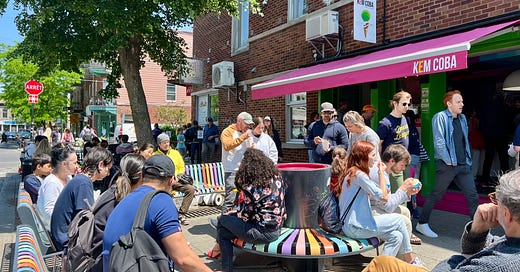Fix Governance 2: Enable Direct Democracy through a 'Right of Initiative'
One way for cities to start rebuilding public trust and strengthen fragile democratic institutions.
Local communities understand the needs of their community better than anyone.
But what happens when a group of residents wants their city to consider something, and the city ignores them?
For example, maybe people are opposed to widening a road. The city’s response is that it’s part of the master plan that was decided a decade ago, and so it continues to move forward.
Or maybe people in a neighbourhood want small businesses like bakeries and tailors to be able to operate out of residential homes. But current zoning makes that illegal.
Easy to ignore
Right now, residents have few options to get new ideas and proposals considered. They could:
Contact their councillor and suggest an idea.
Write a letter to the local newspaper or publish an article on social media. And hope that it gets noticed.
Collect signatures and send in a petition to city hall.
The problem is that all of these actions are easily ignored. They are unlikely to get any traction, let alone consideration by city council.
First step in direct democracy
There is a better way.
Cities can create a platform to provide citizens with the ability to propose specific initiatives.
More specifically, cities could let their residents know that petitions that achieve a certain number of signatures, and which fall within pre-defined criteria, will be evaluated and considered by the city.
There needs to be sufficient support in the community for the proposal, so that city hall does not get overloaded with random requests.
And the final decision rests with elected officials.
But residents deserve — and should have — a clear mechanism to get items onto the agenda for consideration.
Montreal’s Right of Initiative
Montreal has a Right of Initiative that does exactly that.
Anyone can have an item considered by City Hall if they can collect signatures of support from 5% of the population of their borough. (Montreal has 19 boroughs, each responsible for local neighbourhood matters). For city-wide issues, 15,000 signatures are required from among Montreal’s population of 1.8 million.
Certain topics are out of scope, and this is assessed early in the signature collecting process.
Once a Right of Initiative has demonstrated the required community support, Montreal City Hall takes over.
They conduct a fully funded public consultation, produce a formal report and respond to the report’s recommendations.
Will the proponents get what they are asking for? Not necessarily. The final decision on how to move forward rests with the city or borough council. But at a minimum, those residents have their voices heard and their proposal considered.
Other cities embracing direct democracy
San Francisco, California. Portland, Oregon. Hamburg, Germany. Zurich, Switzerland. Buenos Aires, Argentina.
These are some of the better known examples of cities with participatory mechanisms for citizens to have items considered by council or through referendum.
Undoubtedly there are many more examples from around the world.
But there are far more examples of cities that have passed on the opportunity for direct democracy.
Meaningful public engagement
If done sincerely, a right of initiative will increase community engagement and democratic participation in local affairs. A right of initiative can help rebuild trust in city hall.
Our democratic institutions are increasingly at risk. Local government — the level closest to the people — has a critical role to play in engaging citizens and demonstrating the value of democratic participation.
Why aren’t more cities providing residents with a platform for putting issues on the table for consideration by city hall?







This is spot on! We can’t solve any issues before we present them on the discussion table, we need to streamline the process for constituents to connect with the City Hall.
I also noticed that as Ottawa grows more and more diverse, there’s an increasing disengagement between the city and diverse communities especially newcomers.
Have you thought of submitting this to Council or one of its committees?